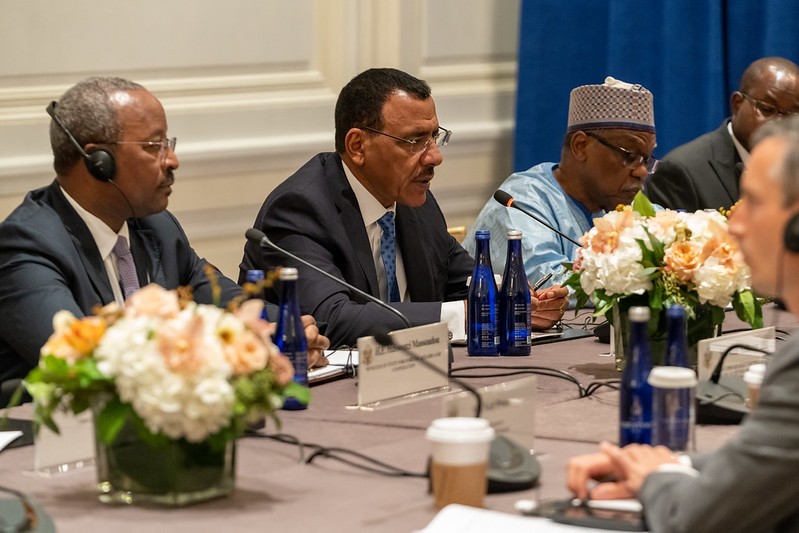ECOWAS Economic Affairs Department's Niger Retreat: Key Priorities

Table of Contents
Boosting Niger's Economic Resilience
Strengthening Niger's economic resilience is paramount to its sustainable growth and development. The retreat highlighted several strategies aimed at building a more robust and shock-resistant economy. These strategies are crucial for achieving the Sustainable Development Goals (SDGs) within the Nigerien context. Key areas of focus included:
-
Economic Diversification: Niger's economy currently relies heavily on natural resources. The retreat emphasized the urgent need for diversification, exploring opportunities in agriculture, renewable energy, and the burgeoning private sector. This shift is vital for reducing dependence on volatile commodity prices and fostering broader economic growth.
-
Attracting Foreign Direct Investment (FDI): Improved infrastructure, such as reliable transportation networks and consistent energy supply, are vital for attracting FDI. The retreat highlighted the importance of implementing investor-friendly policies, including streamlined regulations and transparent legal frameworks, to encourage international investment and stimulate economic growth.
-
Sustainable Development Practices: Integrating sustainable development practices into all economic activities is a key component of Niger's long-term economic strategy. This includes promoting environmentally friendly agricultural techniques, responsible mining practices, and investing in renewable energy sources, all aligned with the SDGs.
-
Human Capital Development: Investing in education and skills training is essential for a productive workforce. The retreat stressed the importance of equipping the Nigerien population with the skills necessary to thrive in a diversifying economy, ensuring future economic prosperity and reducing unemployment.
-
Strengthening the Financial Sector: A stable and well-regulated financial sector is crucial for economic stability and growth. The retreat emphasized measures to enhance financial inclusion, improve access to credit, and promote responsible lending practices within the Nigerien financial system.
Enhancing Regional Economic Integration within ECOWAS
The retreat also focused heavily on enhancing regional economic integration within the ECOWAS framework. Greater cooperation and collaboration among member states are vital for unlocking the region's vast economic potential. Key initiatives discussed included:
-
Trade Facilitation: Reducing barriers to regional trade, such as tariffs and non-tariff barriers, is critical for increasing intra-regional trade. The retreat emphasized the need for harmonized trade policies and regulations across ECOWAS member states.
-
Improved Cross-border Infrastructure: Developing efficient transportation networks and reliable energy grids are fundamental for facilitating cross-border trade and investment. The retreat stressed the importance of collaborative infrastructure projects to connect member states and improve regional connectivity.
-
Harmonizing Economic Policies: Harmonizing economic policies and regulations across ECOWAS member states will create a more unified and attractive market for investors and businesses. The retreat acknowledged the need for greater policy convergence to foster regional economic integration.
-
Joint Investment Projects: Promoting joint investment projects in key sectors like agriculture and renewable energy will generate economic benefits for all participating member states. The retreat highlighted the potential of collaborative ventures to leverage resources and expertise effectively.
-
Strengthening Regional Value Chains: Building strong regional value chains will increase the competitiveness of ECOWAS products in global markets. The retreat underscored the importance of collaborative efforts to enhance production efficiency and market access for regional goods.
Focus on Specific Sectors
The retreat identified specific sectors ripe for development and investment within Niger. These sectors offer significant opportunities for economic growth and job creation.
-
Modernizing Agriculture: Investing in sustainable agricultural practices, including improved irrigation systems and drought-resistant crops, will increase food security and enhance export potential.
-
Developing the Energy Sector: Harnessing Niger's renewable energy resources, such as solar and wind power, will diversify the energy mix, reduce reliance on fossil fuels, and attract investment in the clean energy sector.
-
Responsible Mining: Developing Niger's mineral resources responsibly, ensuring transparency and equitable benefit-sharing, is crucial for sustainable economic growth. The retreat stressed the need for environmentally sound mining practices and the proper allocation of mining revenues.
-
Private Sector Development: Creating a supportive environment for private sector growth, including access to finance, business development services, and reduced bureaucratic hurdles, is crucial for job creation and economic diversification.
Addressing Challenges and Risks
The retreat also recognized the challenges and risks that could hinder economic development in Niger and the wider ECOWAS region.
-
Climate Change Mitigation and Adaptation: Developing effective climate change adaptation and mitigation strategies is vital for protecting Niger's economy from the impacts of climate variability. This includes investing in drought-resistant crops and promoting sustainable land management practices.
-
Security Challenges: Addressing security concerns that hinder economic activity is crucial for fostering a stable and predictable investment climate. The retreat underscored the need for increased regional security cooperation.
-
Poverty Reduction and Social Inclusion: Implementing effective poverty reduction and social inclusion programs is crucial for ensuring that the benefits of economic growth are shared widely. The retreat highlighted the need for targeted interventions to address economic inequality.
-
Strengthening Governance: Improving governance and tackling corruption are essential for building trust, attracting investment, and promoting sustainable development. The retreat emphasized the importance of good governance and transparency.
-
Conflict Mitigation: Promoting conflict resolution and peaceful coexistence within and between member states is critical for maintaining regional stability and facilitating economic development.
Conclusion
The ECOWAS Economic Affairs Department's Niger retreat provided a crucial platform for discussing and agreeing on key priorities for Niger's economic recovery and broader regional integration within West Africa. The focus on economic diversification, enhancing regional integration, and addressing key challenges offers a clear roadmap for future action. The commitment to these priorities is crucial for building a more prosperous and stable future for the entire region.
Call to Action: Learn more about the ECOWAS Economic Affairs Department's initiatives and contribute to the ongoing efforts for Niger's economic recovery and regional development. Stay informed about future ECOWAS Economic Affairs Department strategies for a lasting positive impact on the region.

Featured Posts
-
 Ia Et Ecriture Une Agatha Christie Virtuelle Efficace
May 20, 2025
Ia Et Ecriture Une Agatha Christie Virtuelle Efficace
May 20, 2025 -
 Michael Schumacher Grand Pere Pour La Premiere Fois D Une Petite Fille
May 20, 2025
Michael Schumacher Grand Pere Pour La Premiere Fois D Une Petite Fille
May 20, 2025 -
 Porsches Identity Crisis Caught Between Ferrari And Mercedes Amidst Trade Wars
May 20, 2025
Porsches Identity Crisis Caught Between Ferrari And Mercedes Amidst Trade Wars
May 20, 2025 -
 Tampoy Maxairi Aima Kai Agonia Sto Epomeno Epeisodio Me Ti Marilena
May 20, 2025
Tampoy Maxairi Aima Kai Agonia Sto Epomeno Epeisodio Me Ti Marilena
May 20, 2025 -
 Drug Rasskazal O Plachevnom Sostoyanii Mikhaelya Shumakhera
May 20, 2025
Drug Rasskazal O Plachevnom Sostoyanii Mikhaelya Shumakhera
May 20, 2025
